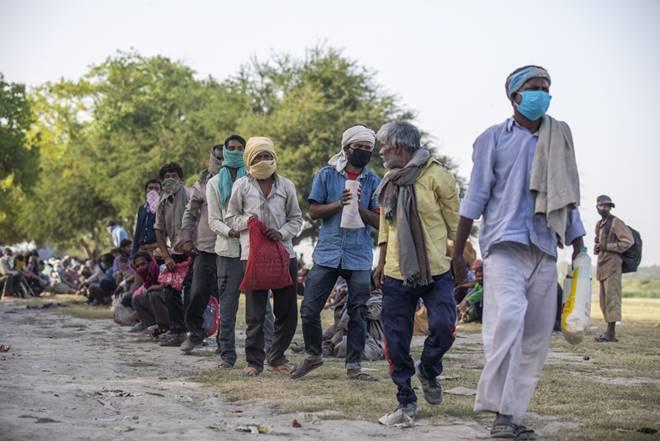This article is written by Chaitanya Acharya and Shantanu Misra.
Table of Contents
Introduction
“The character of our nation is not is not reflected in how we treat the rich and privileged, but how we treat the poor, the disfavoured and condemned.”
The COVID-19 pandemic has cut across class divide and has affected the haves and the have-nots rather equally. However, the economic repercussions in general and the various reforms introduced by governing bodies to revive the declining economy arising due to the complete lockdown by the Indian government, have undoubtedly forced the labourers to bear the brunt of the current crisis. In this background, it is important to study the suspension of labour laws by certain states which adds insult to injury to the already dilapidated conditions of the labourers currently engaged in a mass exodus due to their economic hardships.
This article seeks to analyse few fundamental labour laws suspended by various states through ordinances and notifications and how their suspension is contrary to India’s commitment to the ILO and the possible legal repercussions due to the suspension of labour laws at both the national and the international fora.
Legal validity of the ordinance suspending labour laws vis a vis the Constitution of India
Procedure
Labour laws are a subject of the concurrent list of the Constitution of India. The concurrent list or list III is a list of subjects over which both the centre and the states can pass appropriate legislations and is enumerated in the 7th Schedule of the Constitution of India.
The ordinance promulgated by states for suspension of labour laws seeks to suspend operation of state laws on the subject along with certain laws enumerated by the centre. However, Article 254(2) of the Constitution of India mandates that any law made by the legislature on any matter in the concurrent list, shall be reserved for the assent of the president if such law is repugnant to any law made by the centre on the same subject. Similarly, as per Article 213(1) of the Constitution of India, the Governor shall nor promulgate an ordinance without instructions from the President, if the bill containing the same provisions would have required the previous assent of the President.
Thus, as per the procedural mandate, the ordinance promulgated by the U.P government to suspend labour laws is yet to receive assent from the President.
Fundamental Rights and Directive Principles Of State Policy
The ordinances and notifications seeking suspension of labour laws are violative of fundamental rights on many counts. For instance, the Ordinance passed by the U.P. Government seeks to suspend the Trade Unions Act, 1926 which empowers the workers to form trade unions for the regulation of work-related affairs between the employers and the employees, the suspension of the act is violative of Article 19 1(c) of the Constitution of India, which guarantees the right to form associations and unions and includes the right to form trade unions, within its ambit as held in Raja Kulkarni v. State of Bombay.
Further, the governments of Uttar Pradesh and Madhya Pradesh seek to suspend the Factories Act, 1948, suspension of which would allow the employers to compel workers to work beyond the legally pre-determined working hours. Such a scenario would lead to violation of Article 21 of the constitution which guarantees not mere existence, but also a right to dignity and all aspects which make a person’s life meaningful. Thus compelling the workers to work beyond the mandated work hours would surely impair their holistic development in life and lead to their exploitation which is contrary to the right to a dignified life as mandated by Article 21 and Article 23 of the Constitution, which guarantees protection from exploitation and forced labour. The ordinance promulgated by the U.P government seeks to suspend the Minimum Wages Act, 1948, such suspension is in further violation of Article 23 of the Constitution among other things as the Hon’ble Supreme Court in Sanjit Roy v. State of Rajasthan held that payment of wages lower than the minimum wages to a person engaged in famine relief work results into exploitation and hence it is violative of Article 23 of the Constitution.
Further, the Directive Principles of State Policy which though not enforceable serve as a guide in governance and policymaking, also stand to be deviated from, if the ordinance seeking suspension of labour laws receives Presidential assent. For instance, Article 38 of the Constitution declares that the state shall seek to promote the welfare of the people by securing them social, economic and political justice and minimize inequalities of income, status and opportunities. Article 43 of the Constitution also declares that the state shall strive to ensure a living wage, a decent standard of living for all workers.
Thus, the ordinances and notifications seeking relaxation of labour laws like the Factories Act, 1948, The Equal Remuneration Act, 1976, The Minimum Wages Act, 1948 etc. would inevitably lead the workers being at the mercy of their employers and would result in our country deviating from its goal of creating a welfare state, as enshrined under Articles 38 and 43 of the constitution.
India’s obligation to the ILO
This section will primarily focus upon the Ordinance promulgated by the Governor of U.P. (the largest state India in terms of population) and how the ordinance on receiving a presidential assent would result in a breach of a few conventions of the ILO which India has ratified and the actions which shall be undertaken by the ILO against India.
India has ratified the No. 1 Hours of Work Industry Convention, 1919 on the 14th of July 1921. Article 2 of the Convention mandates that the no of working hours of any person employed in a public or private undertaking shall not exceed 8 in a day and forty-eight hours a week.
Section 51 of the Factories Act, 1948 and Section 17 of the Beedi and Cigar Workers Act mandate the same and thus complement the convention. (The Beedi and Cigars Act allows overtime up to 54 hours a week only on payment of wages for overtime.)
The Ordinance promulgated by the U.P. Government seeks to suspend these laws, and if the ordinance receives the Presidential Assent, India would be in breach of the working hours convention.
Further, India would also stand in breach of the No.5 Minimum Age (Industry) Convention, which it ratified on the 9th of September 1955 and Article 6 of which mandates that children under the age of 12 in India shall not be employed any industrial public or private undertaking or manufactories working with power or employing more than 10 persons. India would stand in breach of this convention as the Ordinance seeks to suspend The Child Adolescent Labour (Prohibition and Regulation) Act, 1986, which is in consonance with India’s obligation to the Minimum Age Convention. As Section 3 and 3A of the act prohibit the employment of children in any occupation and employment of adolescents in certain hazardous occupations.
Presidential assent to the Ordinance would also result in India breaching the No. 100 Equal Remuneration Convention, 1951 which it ratified on the 25th of September 1958. Article 2 (1) of the Convention mandates that members shall develop methods for determining rates of remuneration and inconsistency with these methods promote the principle of equal remuneration, for men and women workers for work of equal value. The breach would occur because the ordinance seeks to suspend the Equal Remuneration Act, 1976. Section 4 of the Act complements the convention and lays down that it is a duty of the employer to equal remuneration to men and women workers for the same work or work of a similar nature.

Article 24 of the constitution of ILO empowers any industrial association of employers or that of workers to make a representation to the International Labour office if any member state within its jurisdiction has failed to observe any convention to which it is a party.
If any trade union in India resorts to this resource, a standard procedure will be adopted to the ILO as per the Standing Orders concerning the procedure for the examination of representations under articles 24 and 25 of the Constitution of ILO.
After acknowledgement of the representation by the Director-General of the ILO as per Article 1 of the standing orders. The Director-General shall then present the representation before the officers of the governing body as per Article 2. [The receivability of the representation is subject to the conditions laid down in Article 2 (2)].
As per the mandate of Article 3 a committee for the examination then may be set up by the Governing body if it is of the view that the representation is receivable. The committee shall consist of members of the governing body in equal numbers from the government, Employers’ and Workers’ group. However, no representative of a nation against which the complaint has been made and no person occupying an official position in the Workers’ or Employers’ association which has made the complaint shall be a part of the committee.
As per Article 6 the committee after completion of the examination of the representation, it shall present a report to the Governing Body. The report shall contain the steps undertaken by the committee to examine the representation, its conclusion and recommendations as to what decision should be taken by the governing body.
A bare reading of Article 9 would reveal that the governing body has wide discretion to accept or reject the recommendations of the committee. Further, Article 10 also empowers the governing body to set up a commission of Inquiry against a member state as per Article 26 (2) of the Constitution of ILO even if a complaint is received under Article 24 of the Constitution of the ILO.
Conclusion
As per the world bank data, the Indian Labour force is more than 400 million strong and over 90% of the Indian labour force is in the unorganised or informal sector, thus it becomes almost impossible for a mammoth portion of the labour workforce to avail any legal protection. However, the same fate could be in store for the labour force employed in the formal sector in various states if the ordinances and notifications seeking suspension of labour laws are implemented. The suspension of labour laws done for the purpose of reviving the economy might as well produce counter-productive results, as one can observe that the informal workforce despite employing more than 90% of India’s labour workforce contributes only about 50% of the national product. The primary reason for this could be the absence of any social security scheme and legal resort, thus hampering the productivity of workers and their ability to compete globally.
While this move by the Government aims to revive and boost businesses and industries, it has received criticism on the ground that the Ordinance and relaxations of key labour laws infringe on worker rights also the suspension of these important labour laws would result in lack of basic working benefits in the formal sector and could hamper the productivity of the workers. Also one of the main reasons of dilution of these labour laws is to kickstart economy but there is little evidence that dilution in labour laws will lead to stimulating the economy, as can be seen during the period 2001-2011, the state of Andhra Pradesh witnessed 11% growth and development despite all labour laws being intact, the report further states that growth in labour market flexibility does not have any statistically significant influence on employment growth. Hence, it will be erroneous in linking dilution of labour laws with stimulating the economy or even decreasing unemployment.
LawSikho has created a telegram group for exchanging legal knowledge, referrals and various opportunities. You can click on this link and join:
 Serato DJ Crack 2025Serato DJ PRO Crack
Serato DJ Crack 2025Serato DJ PRO Crack










 Allow notifications
Allow notifications


